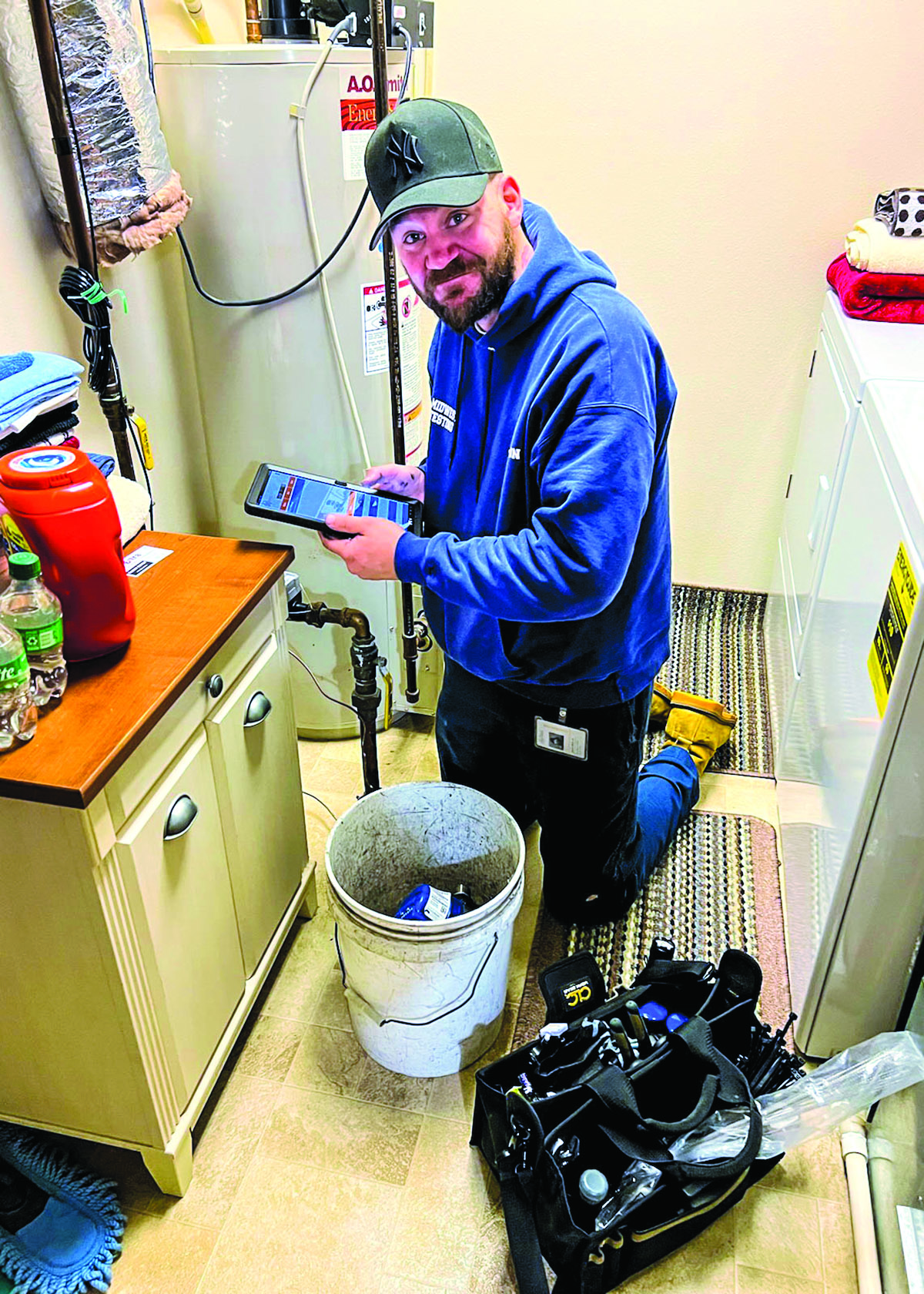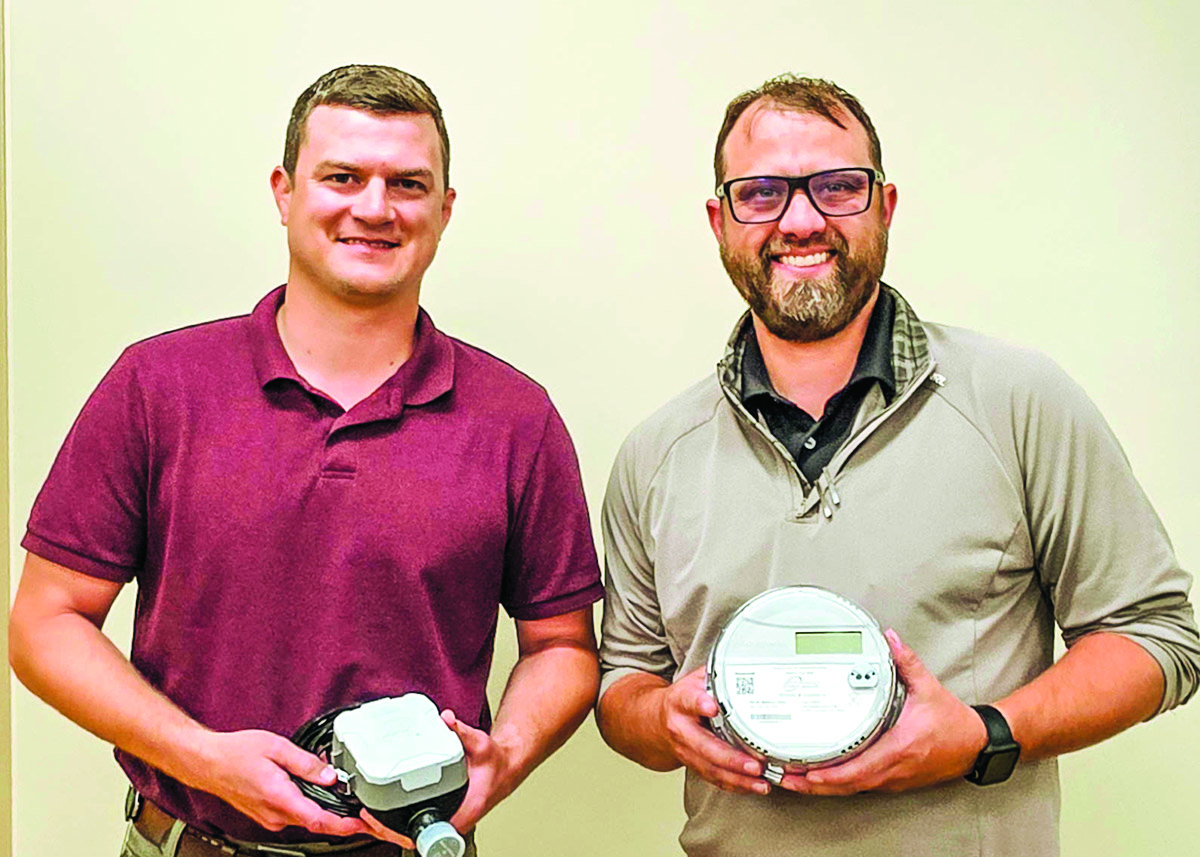
A technician from contractor Midwest Testing installs a water meter in a south Moorhead home. (Photo/Tammy Finney.)

Jake Long and Travis Schmidt of Moorhead Public Service display the new water and electric meters being installed in local homes and businesses over the coming 18 months. (Photo/Nancy Hanson.)
Nancy Edmonds Hanson
Moorhead Public Service has begun replacing the decades-old water and electric meters in every structure in the city – a total of 35,000 of them – in a campaign that’s expected to wind up by the end of 2026.
Two years of planning have gone into the $13 million project, according to MPS general manager Travis Schmidt. “We had to make sure the new meters communicate correctly with the head-end system software and that the billing software would continue to work properly,” he explained.
The current system, in which meters monitor usage and send monthly data that’s used to calculate customers’ bills, still works. But the company that supplies the equipment is discontinuing it in favor of new, more capable units. “They’re not making the equipment we need to read the meters anymore,” he said, “along with other aspects that are obsolete.”
By the time the process is complete, every MPS customer will have two (or, in some cases, three) new meters. Since most electric meters are mounted on the outside of homes and other buildings, most will be replaced without requiring owners to do anything. But water meters are inside. That means residents are going to have to make appointments with MPS to admit the agency’s contractors to their premises.
About 1,000 water meters and 2,000 electric units have already been installed in the first phase of the project. The test phase started in March in the city’s old industrial park. Since then, the old meters have been swapped out in the area between First and 12th Avenues South from 11th to 20th Streets. This week, the process was paused to permit verification that the system that the city purchased is, in fact, meeting its contractual requirements.
Schmidt says that’s a virtual certainty: “We’ve been working very closely with the manufacturers from the beginning.” When that proves correct, installation of the electric variety will continue for the next 12 months. Completion of water meter replacements will take an additional six months or so, since property owners must work with MPS to make appointments to let technicians into their basements, utility rooms, or wherever the meters are found. According to water distribution manager Jake Long, that’s not necessarily a given. “In older homes, it’s a big question mark,” he notes. “We’ve found them underneath bathroom vanities, inside basement walls, in bedroom closets. You never know for sure until you get there.”
Property owners learn of upcoming work in their neighborhoods through a series of letters and notices. The first, mailed out as the project tackles their area, includes information on what and why the water and electric meters will be replaced. Among its points:
The cost of meter replacement – nothing for the customer. The project is fully funded through MPS reserves.
The improved usage information supported by the new equipment.
The switch to a new monthly billing cycle after meters are ready to go in their area.
The potential for a slight increase in billing, since the new meters will be more accurate than the old, which tend to slow down over time.
Finally, the steps residents need to take to schedule appointments for the water meters. (None are needed for most electric meters.)
Two more letters will follow – one concentrating on answers about electric meters, and the next focusing on making arrangements for water meter installation. A bright orange door hanger will give one more notice about mandatory appointments for replacing the water devices.
Finally, if the property owner has not responded to arrange an appointment, the PSC will take the drastic final step: Turning off their water until they comply and make that call.
“So far, most customers have been pretty good about scheduling that appointment and getting the work done,” Schmidt says. “We’re not trying to punish them by cutting off their water, but we have to get their attention somehow.”
Contractors, not city employees, are doing the installations. MPS has contracted with Midwest Testing of Mora, Minnesota, for the water meter project. Electric meter installation is being handled by WESCO, an international Fortune 500 company with a location in Fargo.
The new meters will not be billed to customers, Schmidt emphasizes. He even suggests they may occasionally save them a little money and a lot of trouble. “Now we read the water meters just once a month. In the future, we’ll monitor their water usage continuously. If they’ve developed a problem – leak in the toilet that runs continuously, for example, or a hose outside that they’ve forgotten – we can alert them right away.” That will save a little on the water bill. And it might save the basement.


